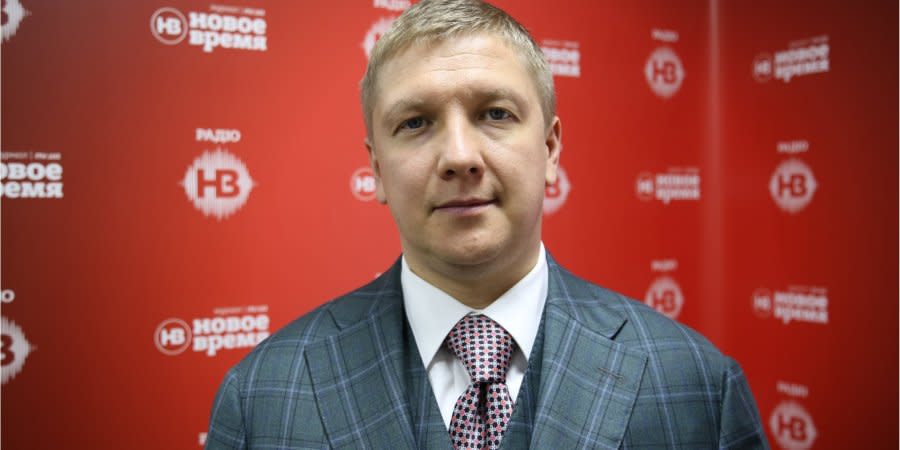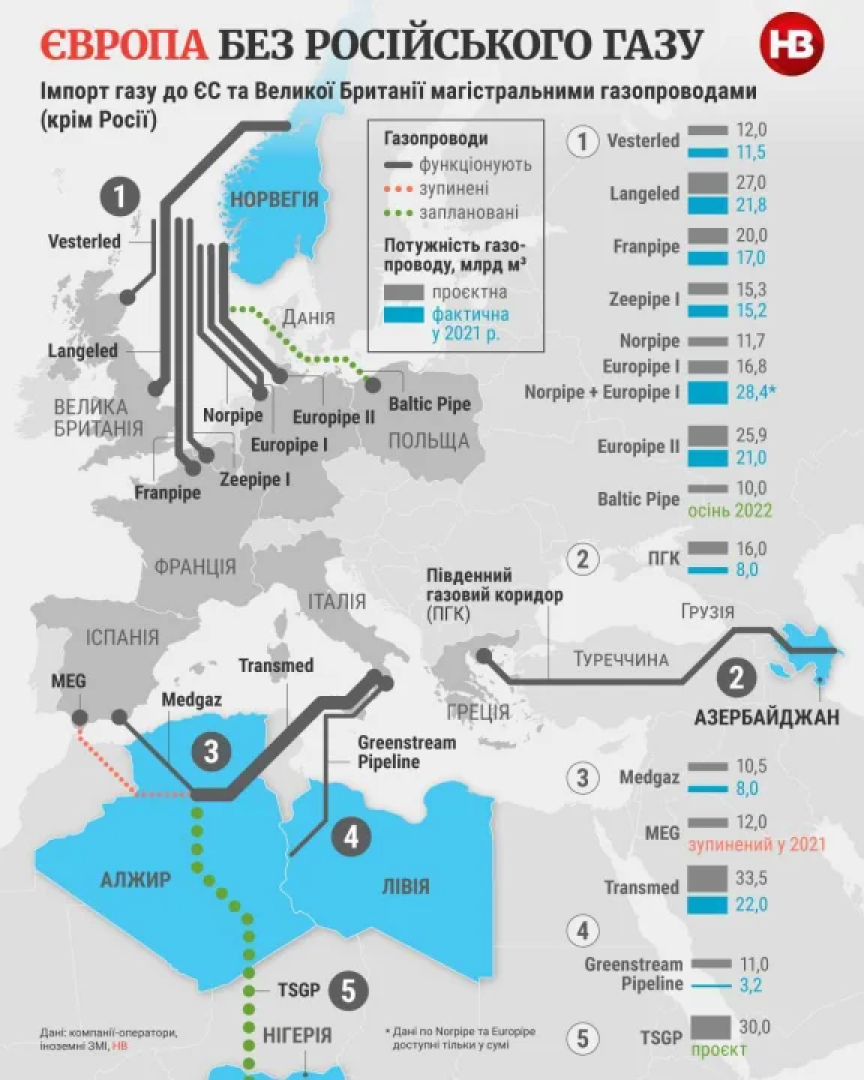Shutting winter gas supply to Europe would spell Gazprom’s end, former Naftogaz chair says

Despite Russia’s Gazprom shutting down key natural gas pipeline Nord Stream-1 (NS-1), the EU has recently reported that its gas reservoirs are filling up ahead of schedule. Ukraine, meanwhile, is struggling to amass the necessary 19 billion cubic meters before the winter heating season begins in late October.
NV: As many experts predicted, Russia is deliberately sabotaging European energy markets. How do you think the situation will develop? Is Brussels adequately prepared?
Kobolyev: I think Europe is in better shape than conventional wisdom and most experts suggest. And it’s not even about sufficient volumes of gas across German and European reservoirs. I’m talking about the European attitude towards Gazprom and Russia: their best and most reliable energy suppliers turned out to be garden-variety blackmailers and scoundrels. It’snow clear the Kremlin cannot be trusted, and gas is also wielded as a weapon. That’s why Europeans are ready – they won’t rely on Moscow at all, opting instead to buy LNG, boost Norway’s output, sign major gas deals with other countries (such as Azerbaijan), and reduce internal consumption. All these measures will prevent Russia from crashing the European gas market.

NV: The 1960s oil crisis transformed Western foreign policy. Is it reasoned to expect current events will make Europe more resistant to Russian influence?
Kobolyev: We’ll have to wait and see if (Russian dictator Vladimir) Putin jumps off the cliff, come winter. If he actually dares to cut off gas supply to Europe this winter – it will be the end of Gazprom’s presence in Euro-pean markets. I don’t think that’s hyperbole. It would be Gazprom’s end.
NV: What else can he do after shutting down NS-1? NS-2 obviously is not an option. Some gas is still being pumped via Ukraine. What else can he cut off in near future?
Kobolyev: I think at some point he can simply halt all gas shipments to Eu-rope.
Read also: Gas prices grow by 30% as markets react to Nord Stream-1’s continued shutdown
NV: Is it true Moscow is burning gas off right now?
Kobolyev: Yes, they’re at the point where they cannot reduce output any further. Just as we explained to our European partners, Russian threats to shut down gas production are unrealistic. There are some newer, high-pressure shafts with no water damage risk – these can indeed have their output reduced significantly. But that’s not an option for the rest of them, and often they make up the bulk of Europe-bound gas. Shutting down one of those shafts means that its output could be reduced by approximately 50% when extraction resumes. Gazprom doesn’t want to tinker with these older shafts, and is burning their output off instead, leaving the option to resume nominal operations at some point in the future. It’s still likely the Kremlin won’t cut Europe off this winter completely. I suspect they’re look-ing for ways to remain Europe’s primary gas supplier.
NV: You mentioned EU diversifying its gas supply; does this mean the “energy apocalypse” is off the table?
Kobolyev: Again – I can’t predict what Putin will do, but he definitely won’t be able to effectively blackmail EU leaders. He no longer has this pressure point to influence them. Even if he cut off gas flows to Europe, the continent will get by, people won’t freeze to death, and nothing truly catastrophic will happen.
NV: At the same time, gas prices are surging beyond record levels, rising to $3,300 per 1,000 cubic meters. Do you think the surge will continue?
Read also: European energy crisis is a globally systemic event
Kobolyev: I won’t attempt to make price forecasts, but it’s much more likely to fall than to rise. We’re seeing a market panic, which will subside by October, in my opinion. That’s how I see the situation developing, but there’s always a risk of unforeseen circumstances cropping up.
NV: Does EU have any other untapped sources to boost gas imports?
Kobolyev: Those are very limited. The key to weathering the gas crisis lies not in importing more, but in reducing consumption. In that regard, Germany’s decision to postpone shutting down its remaining nuclear power plants is very welcome.
NV: Are we about to witness a nuclear energy renaissance in Europe?
Kobolyev: It would be a very good solution, given everyone’s focus on emission reduction. Nuclear energy is clean and cheap and has to be handled responsibly. If humanity is serious about combating climate change, nuclear energy is absolutely essential.
Read also: Naftogaz head speaks on challenges in the upcoming cold season
NV: How is Ukraine’s energy sector going to fare this winter?
Kobolyev: I resolved to avoid making any comments on Naftogaz and related matters, until we emerge victorious.
NV: I see. What can you say about domestic Ukrainian gas extraction?
Kobolyev: Securing the existing extraction capacity is crucial. It’s not possible to increase it substantially in 2022-2023. We have to do everything we can to prevent the Russian military from shutting down currently operational facilities. I think that’s a very real threat, and I assume our government realizes that, as well.
NV: What resources does Ukraine have at its disposal to navigate the toughest-ever winter season?
Read also: Canada to grant Ukraine nearly $350 million for gas ahead of winter
Kobolyev: I’ve seen the government reporting 13 billion cubic meters in gas reservoirs. It’s a very low number, which will require tough decisions for both central heating and consumer gas supply. With some creative solutions – like the ones Naftogaz used in 2014-2015 – it’s possible to get by. But it will take close coordination between the government, local authorities, and the private sector.
NV: What are some of the specific measures along those lines?
Kobolyev: It’s pretty straightforward, and mirrors what we’ve discussed in regards to Europe: consumption reduction and moving away from Soviet-era standards, where every house was supposed to be at least 21 degrees warm by Oct. 15. This is an area where a lot of politicians looked to score political points. With proper policies, implemented jointly by the government, energy companies, and local officials, we can tap into cheap electricity and reduce central heating gas consumption.
NV: What would the optimal indoors temperature be, in your opinion?
Kobolyev: I’m not an expert, so it’s an amateur judgement, at best. Personally, I find it hard to fall asleep in winter if the room is warmer than 19 degrees. I prefer to keep it between 17 and 19 degrees, with a lower gas bill as an added benefit.
Naturally, some cases are different – hospitals, kindergartens, and other such institutions. But in general, maintaining indoor temperatures (at 21 degrees) in winter is economically unsound.
Read also: Price of gas tops $2,500 per thousand cubic meters in Europe
NV: Speaking of critical infrastructure – hospitals, for example. Should we look for backup heating methods, like burning coal or wood? Or, perhaps, electric heat pumps.
Kobolyev: Electric power is the primary way for Ukraine to reduce gas consumption. We have access to cheap power from our nuclear plants. Let’s hope ZNPP won’t be disconnected from our power grid, and will eventually be free of enemy troops. In general, harnessing electricity is our best way to endure this winter.
Of course, if everyone turns on a heat pump in every room of every apartment, not all the buildings would be able to cope with such a surge in power demand. Electric heaters can be used to warm occupied apartments, as many people have left their homes due to the war. Central heating will still be used to maintain minimal temperatures, preventing the system from freezing over and deteriorating.
NV: Since Ukraine’s energy network is now connected to the European one, could we expect on the EU’s support with electricity and gas sup-plies, should the need arise?
Kobolyev: I can’t comment on gas flows from Europe, as it’s a huge prob-lem in general. Ukraine did a great job if integrating its power grid with Europe in wartime. It was an unparalleled success. We’ll be able to receivepower from Europe to cover any emerging shortages. We benefit from both exporting our power surplus, and from balancing any spikes in de-mand we might encounter.
Read the original article on The New Voice of Ukraine

